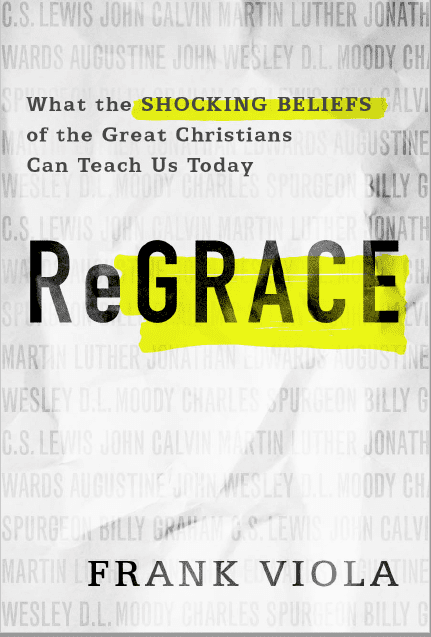What follows is an excerpt from Frank Viola’s new book – ReGrace: What the Shocking Beliefs of the Great Christians Can Teach Us Today. The endnotes which contain first-hand sources are not included in the excerpt.
WARNING: BEFORE GOING FURTHER, READ THIS FIRST
1) Some of the so-called shocking beliefs that I cover in ReGrace are beliefs that I myself agree with. Others I find abhorrent.
Consequently, just because a shocking belief is listed doesn’t reveal how I personally feel about it.
It simply means that many evangelical Christians will find the belief to be shocking (at worst) or peculiar (at best).
Therefore, to those of you who are inclined to finish this book and proudly throw your chest out saying, “Good grief, I wasn’t shocked by any of those beliefs!” remember three things:
You missed the point of the book; each person I feature had people who believed they were heretics during their day; and every one of them still have people raking them over the coals because of their viewpoints.
2) While I disagree with a number of beliefs that each person I feature held, I have respect for each of them. In fact, I cannot tie the laces of their shoes.
Each individual was remarkable in his own right. I realize this means that people who don’t like Calvin, Lewis, Wesley, Augustine, and so forth will be turned off by that statement.
And some may misuse this book as a frontal attack on each person it covers, completely missing the boat on those chapters and the intent of this volume.
Finally, remember, the point of this book is NOT to highlight what our spiritual forefathers believed. It’s simply that they all had imperfect views. For that reason, let’s have more grace and civility whenever we disagree with each other over theology and politics.
The book explains practically how to disagree – even strongly – in a Christlike manner without getting down in the mud and engaging in fleshly, carnal behavior over a diverging viewpoint held by a fellow Christian.
For if the “heroes” of the faith didn’t possess immaculate perception, than the same is true for every child of God today – including you.
—
Read Excerpt Now
The Shocking Beliefs of John Calvin
Beware of anything that competes with your loyalty to Jesus Christ. The greatest competitor of true devotion to Jesus is the service we do for Him. It is easier to serve than to pour out our lives completely for Him. The goal of the call of God is His satisfaction, not simply that we should do something for Him.
~ Oswald Chambers
John Calvin played a significant role in the development of Reformed theology, a theology that still flourishes today.
Hailed as a master theologian, the French Reformer’s writings still live and breathe in the twenty-first century.
Calvin was a second-generation Reformer (he was twenty-six years younger than Martin Luther).
Trained as a lawyer, he possessed a keen analytical mind.
By all counts, Calvin was an intellectual. He wrote the original version of his famous Institutes of the Christian Religion when he was only twenty-seven years old, updating it throughout his life. (Some regard the Institutes to be the single most influential theological work in history.)
….
What follows is not intended to debate the ethics or theological veracity of Calvin—including his system of theology which is still held dear by many. That being interpreted means, those of you who are wired to interpret anything but praise for John Calvin as equating to being “anti-Calvin,” calm down.
Along with Calvin’s admirers, there exists a loud and vocal group of “Calvin-haters.” Often, those who stand against Calvin’s theology think that personally attacking John Calvin is a means of discrediting the theological system of Calvinism, but it’s not.
I have high regard for Mr. Calvin and his contribution, even though I don’t agree with everything he believed. I suspect that when you finish this chapter, you’ll agree that not all of Calvin’s viewpoints were compatible with the teachings of Jesus. That fact alone should make us all more tolerant toward those with whom we disagree over doctrines.
1) Calvin believed that executing some unrepentant heretics was justifiable.
Keep in mind that during the sixteenth century, the church and the state were symbiotically combined. Severe heresy, then, was punishable by death. It was viewed as leading to both societal anarchy and eternal death. Most Christians of that day accepted the death penalty for heretics, except for the Anabaptists (but that’s another story).
The best known example of this societally accepted belief is when Calvin consented to the execution of Michael Servetus, a man who denied the Trinity and infant baptism. Servetus denied that Jesus was the Son of God in the orthodox sense.5
Servetus burned for thirty minutes before he died. Why?
Simply because of his theological views. (Well, it was actually because the fire was really hot, but you get what I’m saying.)6
John Calvin’s supporters are quick to point out that the great Reformer didn’t directly execute the man. And he even tried to persuade Servetus not to come to Geneva. Calvin also attempted to get Servetus to repent and sought for him to be granted a more humane execution (which was beheading instead of burning).
Even so, Calvin made this remark regarding Servetus, showing that he believed death for heresy was justified:
But I am unwilling to pledge my word for his safety, for if he shall come [to Geneva], I shall never permit him to depart alive, provided my authority be of any avail.7
One notable remark by Calvin was, “I hope that Servetus will be condemned to death, but I desire that he should be spared the cruelty of the punishment [of fire].”8
Nine years after the execution, Calvin made this comment when answering his critic François Baudouin:
Servetus suffered the penalty due his heresies, but was it by my will? Certainly his arrogance destroyed him not less than his impiety. And what crime was it of mine if our Council, at my exhortation, indeed, but in conformity with the opinion of several Churches, took vengeance on his execrable blasphemies? Let Baudouin abuse me as long as he will, provided that, by the judgment of Melanchthon, posterity owes me a debt of gratitude for having purged the Church of so pernicious a monster.9
Calvin is also quoted as saying,
Whoever shall now contend that it is unjust to put heretics and blasphemers to death will knowingly and willingly incur their very guilt. This is not laid down on human authority; it is God who speaks and prescribes a perpetual rule for his Church.10
One of Calvin’s contemporaries, Sebastian Castellio, allegedly said this about him:
If Christ himself came to Geneva, he would be crucified. For Geneva is not a place of Christian liberty. It is ruled by a new pope [referring to Calvin], but one who burns men alive while the pope at Rome at least strangles them first.11
Summarizing Castellio’s feelings toward Calvin, Durant remarks,
Can we imagine Christ ordering a man to be burned alive for advocating adult baptism? The Mosaic laws calling for the death of a heretic were superceded by the law of Christ, which is one of mercy not of despotism and terror.12
Whether you agree with Calvin’s view or defend his actions because he was “a man of his times,” many Christians today find the idea of executing heretics to be shocking. Yet throughout various periods of church history, it was widely accepted.13
2) Calvin believed that the Eucharist provides an undoubted assurance of eternal life.
Calvin stated that the sacrament of the Eucharist provided the “undoubted assurance of eternal life to our minds, but also secures the immortality of our flesh.”
In context, Calvin is discussing how Christ is present in the sacraments. For Calvin, believers are united with Christ spiritually. It’s not that Christ comes down to be physically present in the elements, but that believers, are in a spiritual sense, taken up to heaven during the Lord’s Supper to be connected to Jesus spiritually.14
3) Calvin believed it was acceptable to lambaste his opponents with vicious names.
Calvin treated his critics with contempt, calling them “‘pigs,’ asses,’ ‘riffraff,’ ‘dogs,’ ‘idiots,’ and ‘stinking beasts.’”15
In this vein, Calvin said the following words about the great Anabaptist leader Menno Simons:
Nothing could be prouder, nothing more impudent than this donkey.16
—
The above is a short excerpt from ReGrace with the endnotes removed. There’s much more on Calvin and his views in the book.
To order the book, go to ReGrace: What the Shocking Beliefs of the Great Christians Can Teach Us Today.
Here is the Back Cover Description:
The church is tired of seeing Christians act ungraciously toward one another when they disagree. Social media has added to the carnage. Christians routinely block each other on Facebook because of doctrinal disagreements. The world watches the blood-letting, and the Christian witness is tarnished.
But what if every Christian discovered that their favorite teacher in church history had blind spots and held to some false–and even shocking–views?
Bestselling author Frank Viola argues that this simple awareness will soften Christians when they interact with each other in the face of theological disagreements.
In ReGrace, he uncovers some of the shocking beliefs held by faith giants like C.S. Lewis, Luther, Calvin, Moody, Spurgeon, Wesley, Graham, and Augustine–not to downgrade or dismiss them, but to show that even “the greats” in church history didn’t get everything right.
Knowing that the heroes of our faith sometimes got it wrong will empower us to treat our fellow Christians with grace rather than disdain whenever we disagree over theology.















